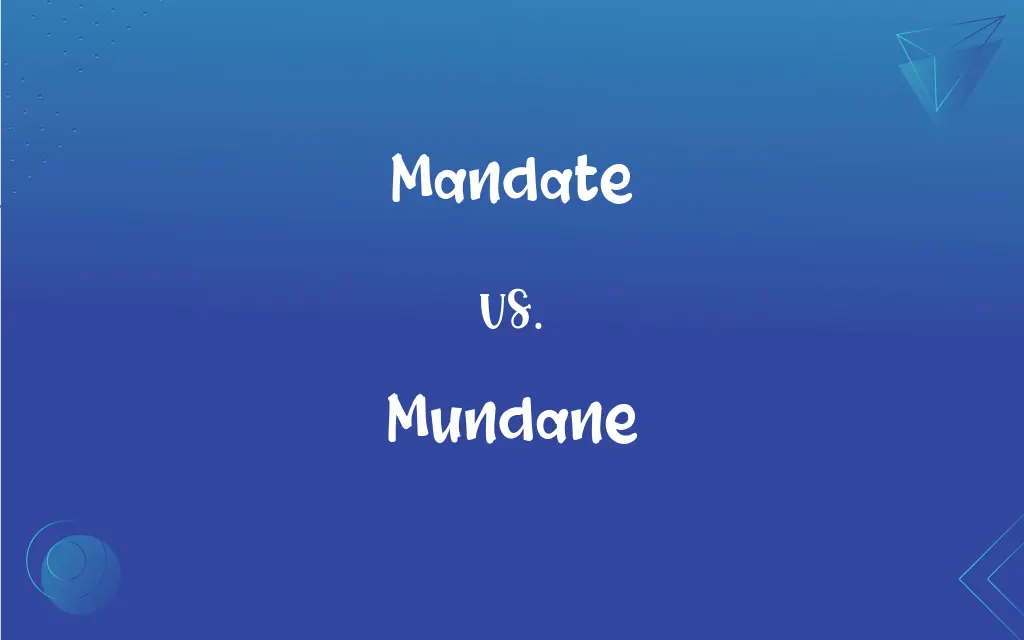Mandate vs. Mundane: What's the Difference?
Edited by Aimie Carlson || By Harlon Moss || Updated on November 6, 2023
"Mandate" is an authoritative command; "mundane" means lacking interest or dull.

Key Differences
A "mandate" is an official order or commission to do something, often given by voters to elected officials or by superiors in an organization. It carries a sense of authority and obligation, requiring the mandate's recipient to act or govern according to its terms. Conversely, "mundane" describes something that is ordinary, not interesting, or related to the practical and routine aspects of life. The mundane is commonplace, lacking the authority or distinction that a mandate implies.
While a mandate often involves responsibilities bestowed upon someone, like a political leader's mandate from their electorate to carry out a policy, the term "mundane" touches on the everyday, the banal, and may refer to tasks or realities that are seen as pedestrian or boring. There is an element of necessity to a mandate; it must be followed or executed, whereas mundane activities are those that are optional, often performed out of routine or necessity without any form of command.
In terms of scope, a "mandate" typically has a wider impact, influencing policies, decisions, and actions on a large scale or within official capacities. "Mundane" activities or details, by contrast, concern the individual or day-to-day life, and they don't carry the weight of impacting broader outcomes or directives. A mandate commands attention and action, while the mundane often goes unnoticed due to its commonplace nature.
From a linguistic perspective, "mandate" is used as a noun and verb, denoting both the act of requiring or commanding and the authority granted to carry out a policy or action. On the other hand, "mundane" is primarily an adjective, qualifying nouns with a descriptor that conveys ordinariness or a lack of excitement. They operate in different grammatical roles, reflecting their distinct uses.
In essence, "mandate" is about compulsion and authority, often involving a group or organization, while "mundane" is personal, describing the prosaic aspects of life. A government may issue a mandate for emergency measures during a crisis, but the same government would not describe those measures as mundane; rather, mundane might describe the daily chores of individuals within that government.
ADVERTISEMENT
Comparison Chart
Definition
An authoritative order or command
Ordinary, lacking interest or excitement
Nature
Compulsory, with an air of formality
Common, everyday, routine
Usage in a Sentence
Used as a noun or verb
Used as an adjective
Context
Political, legal, or organizational realms
Personal, daily life, ordinary settings
Impact
Broad and impactful
Limited to the trivial aspects of life
ADVERTISEMENT
Mandate and Mundane Definitions
Mandate
A command that expresses the electorate's will.
The referendum gave the government a mandate to proceed with the project.
Mundane
Related to the world; worldly, as opposed to spiritual.
His focus on mundane affairs left little time for reflection.
Mandate
An official order to do something.
The court issued a mandate to enforce the new law.
Mundane
Lacking excitement or interest; dull.
She found her mundane tasks at work uninspiring.
Mandate
The authority granted to an elected group or individual.
The president won the election with a clear mandate.
Mundane
Found in the ordinary course of events.
He sought adventure to escape his mundane life.
Mandate
A requirement or duty imposed by one authority on another.
The state's mandate required all towns to recycle.
Mundane
Common; banal.
The conversation at the dinner was mundane.
Mandate
A commission to act in a certain way.
The agency acted under the mandate of the United Nations.
Mundane
Pertaining to everyday, practical matters.
The meeting covered the mundane aspects of office management.
Mandate
An authoritative command or instruction.
Mundane
Of, relating to, or typical of this world; secular.
Mandate
A command or authorization given by a political electorate to the winner of an election.
Mundane
Relating to, characteristic of, or concerned with commonplaces; ordinary.
FAQs
How is "mundane" used in a sentence?
Mundane describes something that is ordinary or dull.
What is the meaning of "mandate"?
A mandate is an official order or authoritative command.
Can a mandate be ignored?
Generally, a mandate carries the expectation of compliance and is not to be ignored.
Does mundane mean boring?
Yes, mundane often conveys a sense of being uninteresting or boring.
Who can issue a mandate?
A mandate can be issued by authorities such as governments, courts, or organizational leaders.
Can mundane be a positive description?
It's neutral, but it can have a positive connotation if one finds comfort in the ordinary.
What happens if a mandate is not followed?
Non-compliance with a mandate can result in legal or disciplinary actions.
Can a job be mundane?
Yes, a job can be considered mundane if it involves repetitive and unvarying tasks.
Is everyday life considered mundane?
Yes, everyday, routine aspects of life are often considered mundane.
What is a political mandate?
A political mandate is the authority voters grant to elected officials to carry out policies.
How does a mandate affect laws?
A mandate can initiate new laws or enforce existing ones.
Are mundane tasks necessary?
Yes, mundane tasks, while routine, are often necessary parts of daily life.
How can I make mundane tasks more interesting?
Adding variety or turning them into a game can make mundane tasks more engaging.
Can a mandate come from a single person?
Yes, if that person has the authority to issue such commands.
Can mundane things be creative?
Yes, mundane things can inspire creativity by challenging one to find interest in the ordinary.
What is a healthcare mandate?
A healthcare mandate requires individuals to obtain health insurance or face penalties.
Are mundane details important?
While not exciting, mundane details can be important for functionality and organization.
Is a mandate always legal?
A mandate often has legal force, but it can also be moral or political.
Does a mandate always come from the government?
No, mandates can also come from other entities, like companies or international bodies.
Is mundane synonymous with normal?
Mundane implies normalcy but with an added sense of tedium or dullness.
About Author
Written by
Harlon MossHarlon is a seasoned quality moderator and accomplished content writer for Difference Wiki. An alumnus of the prestigious University of California, he earned his degree in Computer Science. Leveraging his academic background, Harlon brings a meticulous and informed perspective to his work, ensuring content accuracy and excellence.
Edited by
Aimie CarlsonAimie Carlson, holding a master's degree in English literature, is a fervent English language enthusiast. She lends her writing talents to Difference Wiki, a prominent website that specializes in comparisons, offering readers insightful analyses that both captivate and inform.































































